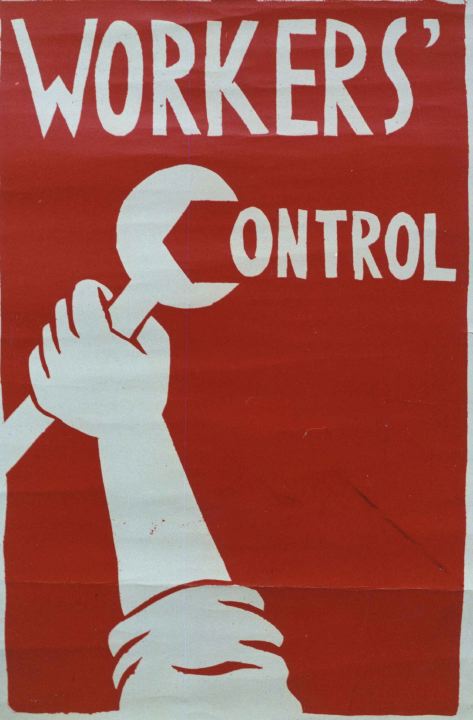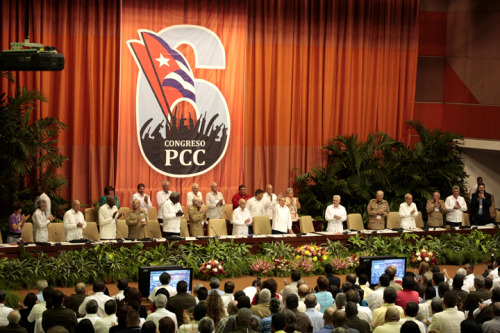cooperatives
Bolivia: Nationalisation puts wealth in hands of the people

[For more on Bolivia, click HERE.]
By Federico Fuentes
May 28, 2013 -- Bolivia Rising, posted at Links International Journal of Socialist Renewal with the author's permission -- Bolivia is demonstrating to the world why nationalising natural resources is a crucial first step for any government seeking to put people and the environment before profits.
On May 1, 2006, less than four months after becoming president, Evo Morales decreed the nationalisation of the country’s gas reserves. This move restored state control over the strategic resource.
In doing so, Morales followed through with one of his key election promises and met a historic demand of the Bolivian people. The people had overthrown successive presidents unwilling to take Bolivia’s gas out of the hands of greedy transnationals.
Britain: The 1970s and the movement for workers’ control

[Click for more discussion of workers' control, cooperatives and "green jobs".]
By Andrew Coates
Trade unions have historically bargained for better terms for the sale of labour power; they have not been able to challenge the existence of the labour market itself. Today, however, the relation between "political" and "economic" struggle have changed.” -- Perry Anderson. "The Limits and Possibilities", in The Incompatibles: Trade Union Militancy and the Consensus,1967.
Mexico: Can worker-owners make a big factory run?

Two workers of the 1000-member TRADOC cooperative. The hiring of women in the plant was one of the many gains of worker ownership. Photo by Bob Briggs.
By Jane Slaughter
April 3, 2013 -- Labor Notes -- A tyre is not just a piece of rubber with a hole in it. I learned this when I visited the workers’ cooperative that makes Cooper tyres in El Salto, Mexico. A tyre is a sophisticated product that comes about through a chain of chemical processes, lots of machine pounding, and still the intervention of human hands.
A fervent inspection worker pointed out that every single tyre is tested under road-like conditions, “If not, it could kill people”, he noted. And, he added practically, “keeping the tyres safe saves our jobs”.
Grassroots interviews from Venezuela: Developing the power of the community

Ana Marin talks about her revolutionary activity.
Cuba's coming co-operative economy?

Havana billboard: “We are working – and you?”
By Marcelo Vieta
China: 'Smashing the iron rice bowl' -- expropriation of workers and capitalist transformation

"Managers have powerful market-based incentives that their predecessors did not—fines, bonuses and the threat of termination." Graphic by Jon Berkeley.
By Joel Andreas
October 2011 -- China Left Review, #4 -- In debates about whether the economic order that is emerging in China after three decades of market reforms can be called capitalist, the main focus has been about trends in the relative importance of private and state enterprises and the role of the state in the economy. These are important issues, of course, involving fundamental features of capitalism. Much less attention, however, has been given to employment relations.
In this paper, which focuses on the restructuring of urban enterprises beginning in the early 1990s, I argue that the dismantling of the old “work unit” system and the elimination of permanent job tenure have effectively severed ties between labour and the means of production. This has changed not only the nature of employment relations, but the fundamental goals of economic enterprise, establishing the foundations for a capitalist economic order.
Camila Piñeiro Harnecker: Cooperatives and socialism in Cuba

September 26, 2011 -- First posted at Cuba's Socialist Renewal, posted at Links International Journal of Socialist Renewal with permission -- Cooperatives and Socialism: A Cuban Perspective is a new Cuban book, published in Spanish earlier this year. This important and timely compilation is edited by Camila Piñeiro Harnecker (pictured above). Avid readers of Cuba's Socialist Renewal will recall that I translated and posted a commentary by Camila, titled "Cuba Needs Changes" [also available at Links International Journal of Socialist Renewal], back in January. Camila lives in Cuba and has a degree in sustainable development from the University of Berkeley, California. She is a professor at the Centre for Studies on the Cuban
Québec Solidaire: A Québécois approach to building a broad left party

Amir Khadir, currently Québec solidaire's sole member of the Quebec legislature, the National Assembly.


